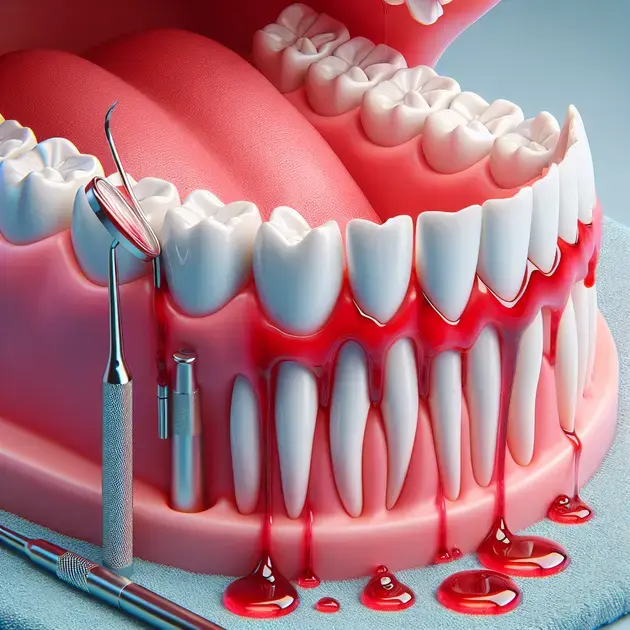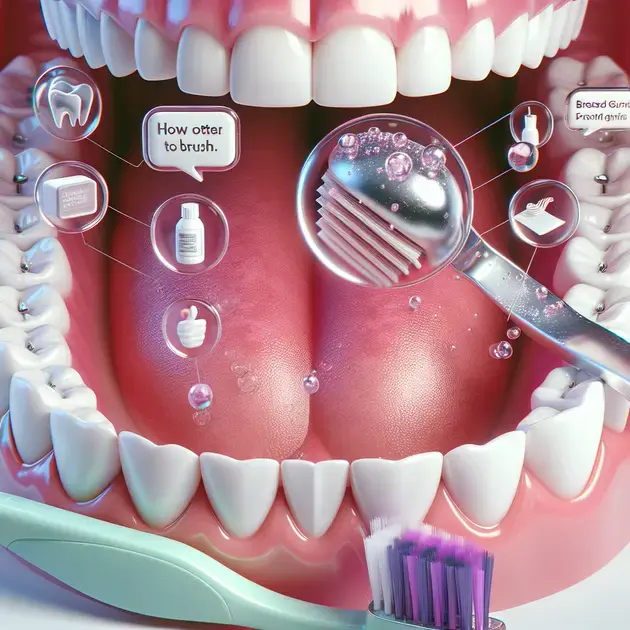Are you experiencing gums bleeding and looking for effective solutions to improve your dental health? You’ve come to the right place! In this comprehensive guide, we will provide you with valuable tips to stop gums bleeding and maintain optimal oral hygiene.
According to recent studies, gums bleeding can indicate underlying health issues such as gum disease or vitamin deficiencies. By following the tips outlined in this guide, you can take proactive steps to address the root cause of the problem and ensure your gums remain healthy and free from bleeding.

Preventing Gums Bleeding: Essential Tips for Dental Health
Gums bleeding can be a sign of poor oral hygiene or underlying dental issues. To prevent gums bleeding and maintain good dental health, follow these essential tips:
1. Brush and Floss Regularly
One of the most important steps in preventing gums bleeding is to brush your teeth at least twice a day and floss once a day. Use a soft-bristled toothbrush and gentle, circular motions to clean your teeth and gums thoroughly.
2. Use Mouthwash
Antibacterial mouthwash can help reduce plaque buildup and prevent gum inflammation. Rinse with mouthwash after brushing and flossing to kill bacteria and freshen your breath.
3. Schedule Regular Dental Check-ups
Visit your dentist for regular check-ups and professional cleanings. Your dentist can identify early signs of gum disease and provide treatment to prevent further complications.
4. Maintain a Healthy Diet
Eat a balanced diet rich in fruits, vegetables, and lean proteins. Avoid sugary and starchy foods, as they can contribute to plaque buildup and gum inflammation.
5. Stay Hydrated
Drinking plenty of water helps flush out bacteria and food particles from your mouth, reducing the risk of gum disease. Aim to drink at least 8 glasses of water a day.
Understanding the Causes of Gums Bleeding
Gums bleeding can be caused by various factors, including:
1. Poor Oral Hygiene
If you don’t brush and floss regularly, plaque can build up along the gumline, leading to gum inflammation and bleeding. Develop a good oral hygiene routine to prevent this.
2. Gum Disease
Gingivitis and periodontitis are common gum diseases that can cause gums to bleed. These conditions require professional treatment from a dentist to prevent further complications.
3. Hormonal Changes
Fluctuations in hormone levels, such as during pregnancy or menopause, can increase the risk of gum bleeding. Maintain good oral hygiene and consult your dentist for advice.
4. Medications
Certain medications, such as blood thinners or anticoagulants, can make your gums more prone to bleeding. Inform your dentist about any medications you are taking.
5. Medical Conditions
Health conditions like diabetes or leukemia can affect gum health and cause bleeding. It’s essential to manage these conditions and work with your healthcare team to prevent gum problems.
Effective Strategies to Achieve Optimal Oral Hygiene
To maintain optimal oral hygiene and prevent gums bleeding, consider the following strategies:
1. Use the Right Tools
Choose a soft-bristled toothbrush and replace it every 3-4 months. Use fluoride toothpaste and consider using an electric toothbrush for more effective cleaning.
2. Practice Proper Technique
Brush for at least two minutes and make sure to clean all surfaces of your teeth. Don’t forget to floss to remove plaque and food debris from between your teeth.
3. Limit Sugary and Acidic Foods
Sugary and acidic foods can erode tooth enamel and contribute to gum problems. Limit your intake of these foods and rinse your mouth with water after consuming them.
4. Quit Smoking
Smoking is harmful to oral health and can increase the risk of gum disease. If you smoke, consider quitting to improve the health of your gums and teeth.
5. Manage Stress
Stress can weaken the immune system and contribute to gum inflammation. Practice stress-reducing techniques like deep breathing or yoga to keep your gums healthy.

Causes of Gum Bleeding Explained
Gum bleeding can be a sign of various underlying issues that should not be ignored. One common cause is poor oral hygiene, which leads to the buildup of plaque and eventually gum disease. Other causes include aggressive brushing, improper flossing techniques, hormonal changes, certain medications, and even systemic diseases like diabetes or leukemia. Additionally, vitamin deficiencies, particularly of vitamin C and vitamin K, can contribute to gum bleeding.
How to Identify the Causes of Gum Bleeding:
To determine the cause of your gum bleeding, consider your oral hygiene habits, any recent changes in medication or health conditions, and your overall diet. It’s also essential to visit your dentist regularly for check-ups and professional cleanings. Your dentist can assess the health of your gums and provide guidance on the best course of action to address the bleeding.
Proper diagnosis is crucial in treating gum bleeding effectively. Depending on the underlying cause, your dentist may recommend improvements to your oral hygiene routine, dietary changes, or even specific treatments for gum disease or vitamin deficiencies. By addressing the root cause, you can help prevent future instances of gum bleeding and maintain optimal oral health.
Proper Techniques for Healthy Gums
Maintaining healthy gums is essential for overall oral health and well-being. Proper brushing and flossing techniques play a significant role in preventing gum disease and gum bleeding. When brushing, use a soft-bristled toothbrush and gentle, circular motions to clean the teeth and gums thoroughly. Avoid aggressive brushing, as it can damage the gums and lead to bleeding.
Effective Steps for Healthy Gums:
In addition to regular brushing, flossing at least once a day is crucial for removing plaque and food particles between the teeth. Be gentle when flossing to avoid injuring the gums. Consider using an antiseptic mouthwash to reduce bacteria in the mouth and promote gum health. Lastly, maintaining a balanced diet rich in fruits, vegetables, and lean proteins can provide essential nutrients for gum health.
By incorporating these proper techniques into your daily oral care routine, you can help prevent gum bleeding and maintain strong, healthy gums. Remember to schedule regular dental check-ups to monitor the health of your gums and address any issues promptly.
Nutrition Tips for Stronger Gums
Proper nutrition plays a vital role in supporting gum health and preventing gum bleeding. Consuming a diet rich in essential nutrients can help strengthen the gums and reduce the risk of gum disease. Vitamin C is particularly important for gum health, as it supports collagen production and helps combat inflammation in the gums.
Tips for Improving Gum Health through Nutrition:
Incorporate foods high in vitamin C, such as citrus fruits, strawberries, and bell peppers, into your diet to promote gum health. Additionally, foods rich in vitamin K, such as leafy greens, broccoli, and Brussels sprouts, can help maintain healthy gums and prevent bleeding. Omega-3 fatty acids found in fish and flaxseeds can also reduce inflammation in the gums and support overall oral health.
Avoiding sugary and processed foods is crucial for preventing plaque buildup and maintaining strong gums. Instead, opt for whole, nutrient-dense foods that support gum health. Remember to stay hydrated by drinking plenty of water throughout the day, as this helps wash away food particles and bacteria that can contribute to gum issues.
By following these nutrition tips and maintaining good oral hygiene practices, you can promote stronger gums, reduce the risk of gum bleeding, and enjoy better overall oral health. Remember that a balanced diet and proper oral care routine are key to keeping your gums healthy and free from issues.
Conclusion
In conclusion, gum bleeding can signify underlying issues such as poor oral hygiene, aggressive brushing, hormonal changes, or systemic diseases. Proper diagnosis and identification of the causes are vital to effective treatment and prevention. By addressing the root cause through improved oral hygiene, dietary changes, and professional guidance, you can prevent future instances of gum bleeding and maintain optimal oral health.
Furthermore, incorporating proper brushing and flossing techniques, along with regular dental check-ups, is essential for healthy gums. Maintaining a balanced diet rich in essential nutrients like vitamin C, vitamin K, and Omega-3 fatty acids can strengthen the gums and reduce the risk of gum bleeding. Avoiding sugary foods and staying hydrated are also critical steps in preventing plaque buildup and supporting gum health.
By following these recommendations and practicing good oral care habits, you can promote stronger gums, reduce the likelihood of gum bleeding, and enhance your overall oral health. Remember, a holistic approach that combines proper nutrition, oral hygiene, and professional dental care is key to ensuring healthy gums and a confident smile.
